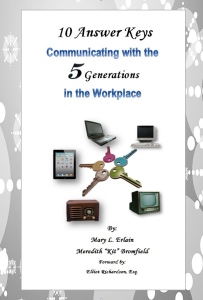Excerpt from “Empowering the Multi-Generational Workforce”
Generation Z’s (born after 1990)
- Also, known as iGeneration or Nextars

- Instant gratification
- Social
- Open books (little kept private)
- Communicate in short spurts
- Crave constant and immediate feedback
- Digital natives
- Affected by 9/11, War on Terror, and Recession
- Hyper-sensitive to conditional changes
- Entrepreneurial
- Technology dependent
- Heroes
- Steve Jobs
- Defining Events
- Recession
- Post 9/11 landscape
- War on Terror
- Boston Marathon Bombing
- Global Warming climate changes
- Social Media
- BP Gulf oil spill
Gen Z’s value transparency. Their lives are an open book. Clearly, social media has opened the door for this behavior. They are a very ethnically diverse generation as well. They have exposure to global information and have it 24/7. They thrive on LIVE community – which to them can be global.
Here are some key excerpts from the “10 Answer Keys, Communicating with the 5 Generations in the Workplace” book.
Gen Z’s are the digital generation. They are wired for fast delivery of content. They have had and require a need for continuous feedback. This comes from their parents for sure, but check out most video games…. constant feedback as well. They are multi-taskers and like the ability to have random access to information. Again, because of their exposure to gaming, social media, etc., they love to explore using their own pathways. It can be difficult for the previous generations to appreciate just how these staff members are wired. They will appear impulsive in their decision making because long decision processes can be foreign and seemingly unnecessary to them.
They do not tend to be team players but are more self-directed. Investing in team dynamics enhancement would be helpful.
As with any generation, clear and defined results need to be communicated. Again, their performance and value to the organization needs to be shared with them more often than once per year in their review.
They want to be the leaders, and may indeed surpass the Gen Y’s in this role. One of the critical differences between Gen Y’s and Gen Z’s is communication. They also communicate using video. If the Gen Z’s want to learn something, they will find a video on YouTube, hence the explosion of the use of video in marketing as well as education and training.
From a time management perspective, the shear speed with which the Gen Z’s process can be of value to an organization. The leadership should be prepared to harness this talent and skill and to nurture the Gen Z’s performance. They are like aliens in a workplace that is still operating in the Boomer mentality. Time, money, and resources need to be invested in the Gen Z’s as they are the ones we will be passing the torch to in our near future. Give them the space, recognition, and direction to operate, and the results can be stupendous.
Communicating to the Gen Z’s (and Gen Y’s too) has a different look to it. Just as in an email, where a different protocol is necessary to be effective, communicating to this generation needs to be in short and direct sound bites. Do not expect perfect grammar or spelling. Sad but true, it is not a priority to them. Instant gratification is necessary, so respond to them in a reasonable period of time…to them that measurement is minutes.
In organizations that wish to embrace this generation in the workplace, they will have much work to do to adapt their processes to accommodate the Gen Y’s and Gen Z’s. Remember, it is not the all-or-nothing approach that will be productive in any situation. The Gen Y’s and Gen Z’s will need coaching and mentoring when communicating in emails and in-person meetings. It is in the compromise where communication can thrive.
Like their predecessors, Gen Z’s are not completely aware of the non-verbal cues. If you detect a sense of urgency and impatience in them, you are usually spot on. Their lives have been filled with instant gratification in everything they do. They are simply wired that way. Resist the temptation to demean this in any way with your own non-verbal communication. Taking a leadership and mentoring role would be the most beneficial approach to provide guidance to facilitating a level of change or awareness.
What makes the Gen Z better positioned to lead organizations is that they have access to more people, resources and information earlier in life by way of the internet. Generations preceding the Gen Z didn’t have access to the same amount of information that the Gen Z has had, and it’s a major advantage.
When hiring a Gen Z, appeal to their entrepreneurial spirit by creating a culture that enables them to focus on new projects directly tied to the organization’s success. They know they are young and just starting out, but they also want a voice. They have ideas, they will look for organizations to listen to their ideas and see the value in them. They do not want to be left on the sidelines.
The Gen Z’s are different from their predecessors, the Gen Y’s. They will lead, not as the collaborators but as individuals. They can build several parallel careers and have the skills to handle the responsibilities through means of technology. They still do need constant feedback and will be very open to personal development coaching, mentoring, etc. Like the Gen Y’s, they are very life balanced oriented.
Is your workplace ready to embrace this generation? It is all too easy to see the Gen Z and mistake them for a Gen Y. Are your hiring practices able to discern from the candidates the generation they are akin to? You are not legally able to ask the question of age, and it isn’t always age that determines the generation that one identifies themselves.

Recent Comments